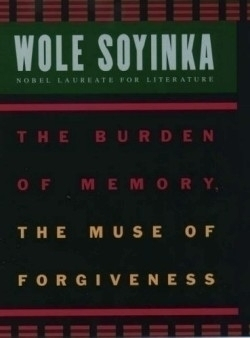It looks like you've stumbled upon a page meant to be read by our code instead of viewed directly. You're probably looking for this page.
The Burden of Memory, the Muse of Forgiveness
Africa, to borrow from Churchill, is a tradition wrapped in tragedy inside a mystery. Her continuing social and political upheaval leads us to believe that her problems are chronic, perhaps fatal. Soyinka, the 1986 winner of the Nobel prize for literature, offers us what boils down to a series of questions in his latest book: questions, which confronted head on may, offer a light at the end of the tunnel not only for Africa but perhaps all of the world’s people.
The primary question is “is reconciliation between the oppressed and the oppressor even possible, given the baggage which is brought to the table?” Less tangible questions Soyinka poses might be stated “are the words used to define our terms appropriate given the source out of which they emanate?” and “where is the transcendent commonality among people that renders such questions obsolete?”
The Burden of Memory, The Muse of Forgiveness is daunting and worthwhile. Soyinka’s view through the microscope at the end of the Petri dish that is Africa is, in itself, important. It is not light reading, and yet not devoid of humor. (Astounding when you consider the fatwah—death sentence—that Soyinka himself lives under at the hands of the Nigerian regime.) It is a book that forces you to read each sentence, drink it, absorb it and move to the next. The literary tension is at times acute, but the payoff comes.
It is important to remember that Soyinka is a strident secular humanist, and it is from this meridian that his philosophic survey begins. Viewed through this prism, the book (which is in fact a derivation of three lectures which Soyinka delivered for the Genevieve McMillan Foundation) is more easily understood. For example, the book reaches somewhat of a rhetorical crescendo when appropriating the lives from Martin Luther King’s Letter from the Birminham City Jail, King’s five-year-old son asks: “Why do white people treat colored people so mean?”
A Christian, like King, would dispatch that question easily: Because man is irretrievably corrupt, and the only way to global salvation is through faith in Christ. Soyinka answers the question with more questions. This, of course, is the way a humanist deconstructs monumental moral issues: to define and redefine the most spectacularly miniscule of words contained within the question, mix them up, pose another question, and move on. Which is the Gordian Knot of humanism: definitions escape definition. All viewpoints of all humans have equal value, without regard to intellectual probity or honesty. The pantheon of humanism includes every human, not only Wole Soyinka, but Sani Abacha, the Mwamis and Billy Graham. How does Soyinka decide which view prevails? He simply decides. Which is what the book is about. Soyinka cannot be gainsaid on this. He knows what he’s decided, without the guidance of remote deities or ideological authority beyond his own. And this must be recalled when reading his postulations. Salvation for Africa, in Soyinka view, is through the “muse of reconciliation,” as hinted through the tones of an ancient xylophone called the Sosso-Bala, a musical instrument forged in the furnace of long-ago war. An interesting metaphor, no doubt, but as for Africa, it is in desperate need of something more than man-scented words.
Reviewed by
John Arens
Disclosure: This article is not an endorsement, but a review. The publisher of this book provided free copies of the book to have their book reviewed by a professional reviewer. No fee was paid by the publisher for this review. Foreword Reviews only recommends books that we love. Foreword Magazine, Inc. is disclosing this in accordance with the Federal Trade Commission’s 16 CFR, Part 255.
